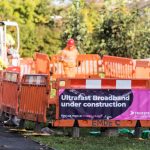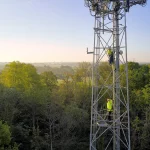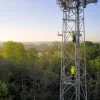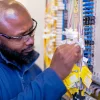IoD Calls on Openreach to Abolish Infrastructure Access Costs for ISPs UPDATE2
The Institute of Directors, which represents roughly 35,000 business leaders and directors, has proposed that one way to boost the national UK rollout of fibre optic broadband services would be for Openreach (BT) to abolish the access costs for ISPs seeking to tap into their network infrastructure.
The IoD’s Energy Policy Adviser, Dan Lewis, told the The Telegraph that the United Kingdom was lagging behind other European countries in terms of broadband speed and that “rolling out fibre optic cable [is] relatively straightforward, and will provide a significant boost to businesses.”
Dan continues on to complain that the Government’s time-scales are too slow and he suggests two examples of ways in which this could be sped up, such as by setting a 2025 deadline to switch off the old legacy copper network. On top of that he also suggested abolishing the access costs for ISPs or other companies that wish to harness Openreach’s existing infrastructure (cable ducts and poles etc.).
Advertisement
We should point out that the IoD has previously (2016) called on the Government to ensure that everybody could access a 10Gbps (not a typo) capable broadband network by 2030 (here). The Government has recently pledged that 15 million premises would be covered by Gigabit capable Fibre-to-the-Premises (FTTP/H) technology by 2025, before potentially reaching universal coverage by 2033 (here). But the latter target is currently more of a vague aspiration than a solid commitment, with no funding behind it.
An Openreach Spokesperson told ISPreview.co.uk:
“Our ducts and poles have been open since 2011 and we’ve taken steps to make the process of accessing them more user friendly.
As a regulated business we’re following the price controls set by Ofcom in their Wholesale Local Access Market review of 2018, which has seen rental charges for infrastructure access reduced by around 50%.
Ofcom’s own analysis suggests these changes could halve the upfront cost of building competing full fibre networks and has set prices which allow Openreach to make an appropriate return.
The economics of network investment remain challenging for everyone and we’ll continue to work closely with industry, leading up to our final reference offer in 2019.”
As usual it’s difficult to know the substance of what Dan is proposing from a few lines in a newspaper article, although somehow we think that effectively asking Openreach to give away access to their physical infrastructure for free (it’s anything but free for them to build and maintain) probably isn’t going to hold much water. On top of that it’s an odd idea for a pro-business organisation to be proposing.
Dan suggests that in some areas this could cut the cost of building fibre optic broadband networks by as much as 90%, but Openreach are not a charity and won’t give away access for nothing in return. This could potentially also risk discouraging investment in their core infrastructure.
On the subject of switching off the copper network in 2025, this rather depends on context. In fact Openreach have already begun to consult on the process and timeline for withdrawing their Wholesale Line Rental (WLR) service by 2025, which underpins a lot of traditional copper telephone lines / PSTN (here).
Advertisement
However, physically removing the copper itself is a different ball game as some services, such as G.fast, may still be using it until pure fibre optic lines become universal. Copper will be around for a fair bit longer and it’s probably a bit too early to set a solid target for its complete removal until we can be sure of the fibre coverage. We rather suspect that the government may bend to support a more natural withdrawal over time, as FTTP is deployed to replace it.
Finally, Dan’s suggestion that the UK lags behind Europe on broadband speed is a bit of a tricky one, which once again depends on the context. If we are only looking at coverage by fixed “superfast broadband” (30Mbps+) capable ISP networks then the United Kingdom is actually ahead of most other countries in the EU (here), but we’re right at the bottom when looking solely at pure fibre optic (FTTP) lines and not so strong for “ultrafast” (100Mbps+) services either.
UPDATE 27th June 2018
Openreach has sent us their response, which is pasted above.
Advertisement
UPDATE 27th June 2018 (no.2)
The relevant IoD report can now be found online (here) and it adds some useful context for Dan’s proposal. The relevant text is as follows and it clarifies that open access with zero charges to cable ducts/poles should only be applied if the 3rd party agrees to resell usage of the fibre to other third parties, including back to BT and Openreach.
So mercifully it’s not a something for nothing approach but getting the details right to make it work would be tricky (e.g. how much the third party should charge when they resell back).
Extract from the IoD Report
A consultation response by INCA (trade body for the alternative network providers), anticipated that it would take 15-20 years at the current pace. There are 3 reasons why:
• The historically high cost of accessing BT’s physical infrastructure of ducts and poles -costs which are not present in other countries many of whom are far ahead of the UK in fibre optic cable rollout. So high in fact is the cost of accessing Openreach poles – at £10 per pole per year- that one company in Scotland, Comms World, which had planned to connect up homes with “aerial fibre” – wrapping it round telephone lines and poles and thus avoiding the cost of digging – realised it was cheaper to erect their own poles at £500 each.
• BT’s pension deficit is £14 billion, so the main cash cow of the BT group, Openreach needs to hold onto and sweat as long as possible its copper assets and will not gain any new revenue with fibre optic replacement which will have to be done at cost.
• Openreach is planning to extend the lifespan of the legacy copper network with upgraded but nonsymmetrical G.fast technology, crowding out Alternative Network providers offering full fibre.
We propose 4 solutions:
1. Lower access charges to all Openreach ducts and poles to zero for third parties. This open access should only be applied if the 3rd party agrees to resell usage of the fibre to other third parties, including BT and Openreach. This would transform the build-rate for fibre optic cable, particularly in the more remote areas where the cost per premise served could fall from £2,000 to £200-£400. It would also tap into a lot of investment capital (that BT simply does not have) to pay for the fibre optic cable upgrade – particularly in the lowest yielding part of the network – rural areas. Shared, and low-cost, open access to pre-existing infrastructure would drive next generation fibre optic competition and investment, as Lithuania was able to do 14 years ago, leading to its current top-rated e-infrastructure in the EU.
2. Increase and expand the remit of the government’s UK Full Fibre Network Fund to target investing in new ducts and poles as well as their upgrades and maintenance. Lowering access charges to the physical infrastructure to zero eliminates the incentive to build new ducts and erect new poles. It also removes the incentive to invest in maintenance and upgrading of the capacity of the existing infrastructure. How good the existing physical infrastructure is also not totally known with large areas only serviced by ductless buried copper cables. But it is clear that it does not have adequate capacity for expansion and will require ongoing maintenance and upgrading.
3. Government should set a copper switch-off date of 2025. Though an ambitious deadline, this would create certainty for investors and has a precedent with the switch-off of analogue TV signals. From an engineering point of view, this is straightforward. From a scale-up and labour force perspective, it is more difficult. A mandated switchover will run into problems of those who don’t want to switch from copper and ISPs reluctant to handle a surge in customer gripes when invariably it fails to run smoothly. Regardless, this is an investment that will have to happen and running a hybrid network copper and fibre network will be much more expensive and less efficient and translate into a drag on the British Economy vis-à-vis its competitors.
4. There is a wide disparity of investment suitability for fibre to the premises (fttp) across the country. Divide the country’s network areas into 3 different levels; competitive areas – where 2 or more network operators can build and compete with each other, monopoly – where only one competitor could operate and uncommercial – where the costs of fttp are prohibitive. The first two areas will require some scaled investment covering areas reached by up to 5,500 exchanges. For uncompetitive areas working with much smaller shapes like remote communities, villages and streets connected by a green cabinet or a distribution point, we need a bottom up approach. Once that community has 50% of residents ready signed up to an ultrafast switchover, they could outsource to a big range of network providers, including Openreach, which can bid competitively to do the work. Councils should be given freedom to subsidize contracts to increase speed of deployment and coverage at their own discretion.
Mark is a professional technology writer, IT consultant and computer engineer from Dorset (England), he also founded ISPreview in 1999 and enjoys analysing the latest telecoms and broadband developments. Find me on X (Twitter), Mastodon, Facebook, BlueSky, Threads.net and Linkedin.
« H1 2018 – Top 10 Fastest National UK Broadband and Mobile ISPs
















































Comments are closed